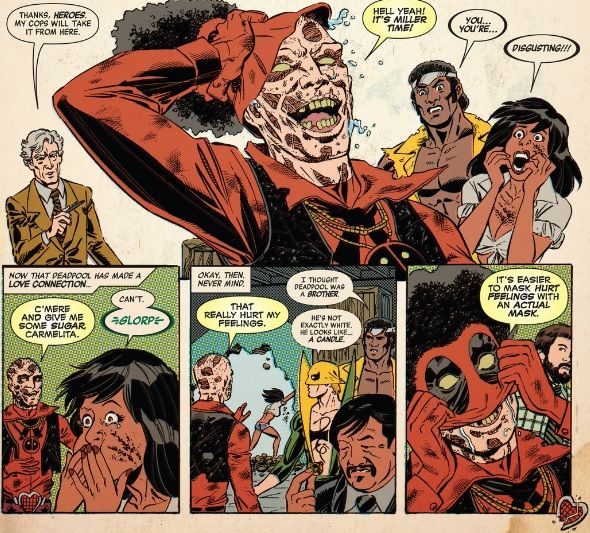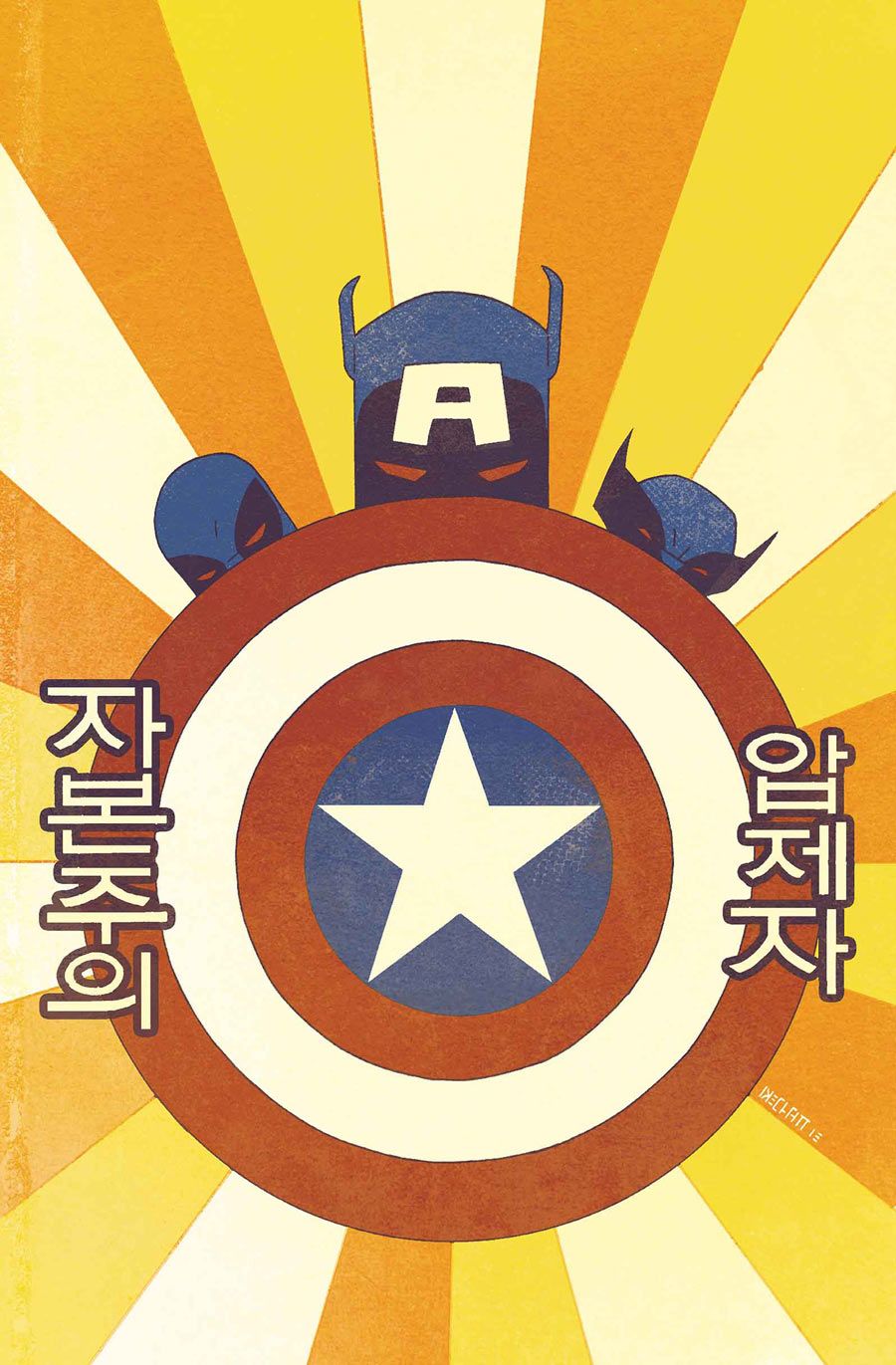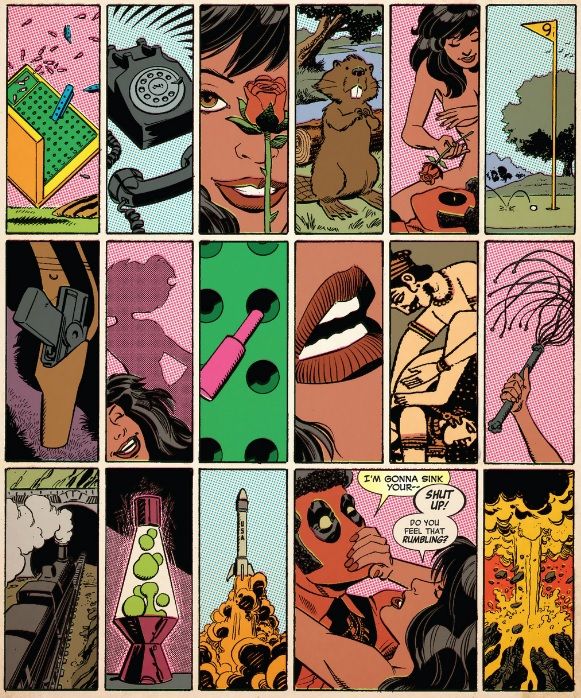I hate "dark and gritty." Some days I wake up and say a little prayer on announcement weekends like this one, where the House of Ideas sells us on the next batch of comics' twists and turns that no one hails a new book as being a must-read because it will be "dark and gritty." I like to think that's we've moved past thinking that shading your books in big, black washes and stockpiling your panels in death, dismemberment and human anguish means your comics are better or "more realistic" than one that's more lighthearted. After all, death not only gets you an annotation in the Overstreet guide, but it also means something important has happened.
That's what makes Deadpool so interesting as a character and as an ongoing comic. Nothing really important happens in a Deadpool comic; he doesn't cross over with big events all that often, and he's more a guest star in other characters' comics than a major player in his own. He also happens to be wacky, dangerous in a Bugs Bunny sort of way and more self-aware than most heroes, whether anti- or super-. With the right creative team, Deadpool can make you think while making you laugh, or tug at the heart string and your funny bone. At his worst, he's like a CBS sitcom: high in ratings, panned by critics, divisive in his target audience and competing against the better shows.
Marvel NOW! Deadpool wonderfully leans toward the former, with Gerry Duggan and Brian Posehn balancing humor and horror on a katana's edge, as Deadpool #18 expertly delivers on both this week.
WARNING: HUGE spoiler for Deadpool #18 this week, so please grab your copy and a box of tissues and read along!
This current volume of Deadpool has certainly been a slow boil, using readers as a frog in a funny pan of boiling water and slowly turning up the dramatic heat while we're entertained by hilarious antics of the Merc with a Mouth. Just this morning, Gerry Duggan himself told the crowd at New York Comic Con, "We're playing a long game. We are plotted a long ways out and there's going to be some real consequences out of 19 that change Deadpool."
It's hard to think of something major and serious happening to Our Man 'Pool, considering how ridiculous he's been. We've watched him fight undead presidents, but also gain a more sympathetic voice in his head with the ghost of Agent Preston sharing his thought bubbles. We've giggled at the "lost" issues, those throwbacks set in the style of old Marvel comics and placing DP in the Iron Man armor or side-by-side with Power Man and Iron Fist (whether they want him there or not). These throwback issues also put Deadpool in a better context within the Marvel Universe; sure, they're funny, but they also show him as less a guest star or vestigial X-character and more of a larger part of an even larger whole.
Then, of course, there's Carmelita.
Deadpool #13 is a perfectly innocent book. It's the throwback issue I mentioned above, explained to us as an issue "shelved by THE MAN back in 1977 for being too controversial. Or too stupid, the records were a little unclear." In this issue, Deadpool forces a team-up with the Heroes for Hire to stop nefarious crime boss "The White Man" from harassing a little local bodega run by the Camacho family. Carmelita's father was killed by the White Man, and the Heroes for Hire are there for protection; despite the best intentions, Deadpool and Carmelita get kidnapped. In what Carmelita thinks are her last moments before she too is killed, she and Wade have relations for 17 panels. Later, when Deadpool removes his mask, Carmelita flees in disgust at his hideous face. The last panel seems to be laying it on thick, as Deadpool says that "It's easier to mask hurt feelings with an actual mask!" He's smiling, but he's crying when he pulls the mask back over his face as his yellow eyes seem to be talking directly to the audience. It's not only a deep little moment when you think it over, a discordant note in an otherwise kind of tongue-in-cheek story, but it's also a warning.
In the recent storyline, "The Good, the Bad and the Ugly," the mastermind smirkingly named Butler has been kidnapping Deadpool and stealing his organs, only to wipe his memories afterward, and probably causing even more chaos to his unstable mind. When he confronts Butler on his nefarious scheme, Deadpool is told that if he kills him that Wade will never see his family again - the family he started with Carmelita from Issue 13. Now that throwback issue isn't a throwaway comic, despite being a comicly timed issue. Now we get to wonder if Butler's telling the truth, if Deadpool might be a dad, how he found Carmelita and her daughter in the first place ... the reader's mind starts to work this over while Wade fights through Butler's cloned mutant heroes. There's other things going on, but Deadpool's belief, that he has to find his family, starts to become real. Which is why this week's issue hit so hard: The reader had to sober up a little bit to take in this new plot twist, making the fight in Butler's secret facilities in North Korea a little more serious. As Wolverine and Captain America, two other Weapon Plus projects, get embroiled in all of this, they too reconsider their opinion of Deadpool from wacky kook to unstable underdog. There's a lot of sympathy thrown around as they free the camp in which Carmelita and her daughter are being kept and all the supporting cast catch on to just how serious things have gotten before Deadpool does. The last two pages are the worst: Carmelita is dead in a mass grave, and Wade Wilson collapses in a tormented, sobbing wreck as he realizes that his association with her is what killed the woman that carried his child as well as the child herself. His mask is gone, he sobs openly.
Tragedy is easy; we all know what heartache and sorrow are like, no matter to what degree they're felt. Some say that tragedy plus time equals comedy, but I don't think we'll be looking back at this story arc and laughing even in the distant future. But doesn't that make him all the more human, all the more heroic for surviving? Gerry Duggan told CBR recently that, "I think what we're trying to do with 'The Good, the Bad and the Ugly' is offer an explanation about why his past is so muddled, but do it in a way that doesn't invalidate a single page of previous story. There are things that have happened to him that he remembers, some he doesn't, some were implants -- and who knows what was really what. From there, he's got a little group around him that can give him the friendship that can pull those emotional strings. His core group of surroundings might grow next year. It might do some shrinking, too. That expanding and contraction offers a chance to bring Deadpool some joy, or pain. Such is life. Even for Wade Wilson."



